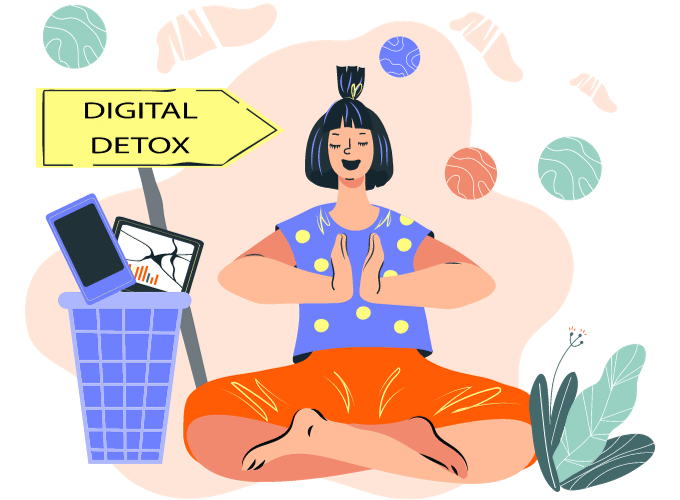Even if you know the disastrous consequences of the comparison trap, it’s not always easy to stop comparing yourself to others.
But why?
And how to never compare yourself to others again?
That’s exactly what we’ll uncover in this article.
You’ll learn what keeps you trapped in the validation loop. And you’ll learn 13 effectifve ways to stop comparing yourself to others for good.
Let’s dive in!
- Why do you compare yourself?
- How does comparison affect your life?
- 13 Ways to stop comparing yourself to others
Why do I compare myself to others in the first place?
This is a question I once asked myself.
No matter how often I tried to escape the comparison trap, it always sucked me back in.
We naturally seek validation and acceptance as human beings. After all, we’re social creatures and want to be part of a tribe. And obtaining social status opens many career and mating opportunities.

Who doesn’t want those benefits?
Even as an introvert, I struggled with those desires. I remember being envious of how effortlessly my extroverted friends interacted with the opposite sex.
And so I tried to be like them to achieve similar results.
But that was a big mistake.
How does comparison affect your life?
When you constantly compare yourself to others, you dismiss your own unique qualities and personal strengths.
What happened when I tried to be the life of the party like my extrovert friends?
Not only did I appear fake, I felt empty inside too.
The same is true for success in all other areas of life.
Lots of people obsess over results like money and fame. And they pursue shiny objects and external promises to feel good. But they feel more dissatisfied as a result.
The most impactful effects of constant comparisons are:
- Inauthentic living: The need for constant comparisons leads to an external focus and distracts you from your life’s path.
- Negative emotions: Fear, jealousy, and resentment are dominant emotions when you frequently compare yourself to others.
- Lack of motivation: Comparisons lead to short-term gratification and shiny objects, distracting you from what truly excites you.
- Unrealistic expectations: Comparing your inner world to one’s outer projections (like on social media) is a false comparison.
- Low self-esteem: You’ll always feel inadequate because there’s always someone smarter, stronger, richer, or more successful.
- Mental health issues: All the above creates a distorted self-image, leading to chronic stress and emotional instability.
Constantly comparing yourself to others leads to envy, inauthentic behavior, and lasting dissatisfaction.
Instead, a life well lived is a life of your own.
So…
13 Ways to stop comparing yourself to others
The idea of the following strategies to avoid comparing yourself to others comes down to two simple ideas.
The first one is this:
You suck at almost everything – and so do I.
It’s easy to find someone who’s better or has more of anything. That’s also true for your best qualities. I mean, look online, and you’ll quickly find someone who excels in your area of expertise.
However, none of that really matters.
Because here’s the second idea:
You’re unique, and so is your life’s journey.

Even if you engage in shadow work and copy someone’s style, your insights and experiences are still unique. So rather than focusing on other people’s lives, unlock your own code to personal fulfillment.
Here’s how:
#1: Become obsessed with the internal game
Rather than playing the comparison game, become obsessed with the internal game:
To become a fraction better than you were yesterday.
Think about learning new skills, acting on your goals, and nurturing your mind, body, spirit, and relationships.
But it also includes spending time on self-reflection and recovery – an aspect busy people often forget.
The only person you should compare yourself to is who you were yesterday. It stops you from comparing yourself to others.
And it also leads you to…
#2: Accept and appreciate your journey
You can’t change the past or the present.
But you can change your attitude towards them.
After all, you’re exactly where you’re supposed to be.
Resisting this belief leads to powerlessness and frustration. It’s difficult to move forward if your inner critic holds onto your past self.
But what if you accept that everything happens for a reason?
Magic happens.
You become more appreciative and grateful for life’s difficulties and lessons. And rather than wasting your energy to resist the past, use this force to propel you towards a better future.
That’s how you regain personal power.
Acceptance and appreciation removes resistance, allowing you to make positive changes in your life.
It’s a process that can take some time but is worth pursuing.
Good habits include mindfulness meditation and reading philosophical books. For example, a great beginner’s book is The Daily Stoic.
#3: Change the game through introspection
Self-awareness changes everything.
And here’s why:
You can have it all: the yacht, mansion, luxurious cars, exclusive parties, a private chef, freedom to travel around the world, date the perfect girl or guy – and still feel unfulfilled.
You only unlock true freedom and personal fulfillment when you live in alignment with your most authentic self.

Nothing else really matters.
Of course, you need to pay your bills. And you want good people around you. But once those basic needs are met, what matters most is living a life that aligns with your core essence.
That’s why self-discovery is important.
And here are some great starting points:
- Reflect on your core values
- Uncover your personality traits
- Find and lean into your strengths
- Discover new interests and passions
- Identify your true purpose in life
- Set a couple of life goals
Also adopt a habitual self-awareness practice for consistent self-improvement. For example, start a simple journaling practice with one of the best guided journals. The 5 Minute Journal is a perfect option for beginners.
Introspection can also help you to…
#4: Find a meaningful pursuit
What do we do when we lack direction in life?
We seek short-term gratification.
For example, I watched countless hours of the latest get-rich-quick schemes on YouTube.
How can I become a millionaire – fast? As if that would solve my lack of communication skills, confidence, and character…
I chased (quick) results, not fulfillment.
And it didn’t bring me any success or joy.
Instead of obsessing over results, find an enjoyable process. Find out what you’re good at and what you like doing.
Of course, you can still align this approach with your bigger dreams. For example, I always wanted freedom. So I only pursued interests through which I could earn a living online.
But my first priority became to find joy in the process.
That led me to start a blog and learn about Search Engine Optimization (SEO). I enjoyed learning these skills so much that I quit finance and pursued a career as an SEO specialist.
And I’m so glad I did.
This career was joyful, which made me eager to learn. And today, I’m a freelance SEO specialist and have the freedom I desire.
The moral of this story?
Stop comparing yourself to others to figure out what you should do.
Instead, follow this simple step-by-step plan:
- Explore and experiment to find what interests you.
- Pick the one skill that interests you the most.
- Set learning goals to master that specific skill.
- Learn as much as possible in the next couple of months.
- Embrace active learning through daily deliberate practice.
- Measure success by your progress – not your achievements.
- After a couple of months, reflect on your experience. Do you want to continue with this skill? Did you find something more interesting?
Commit to a process you enjoy, not just for the desired results.
And here’s a tip for finding a process you love:
#5: Focus on your strengths
Embracing your superpowers boosts productivity, self-esteem, and success. It also shifts your attention away from flaws and shortcomings.
And it often aligns with what you enjoy doing most.
Here’s how to find your personal strengths:
- Take a strengths assessment like the HIGH 5 Test.
- Consider the activities that bring you joy (and wonder why).
- Identify what naturally comes easy to you.
- Notice what gives you a lot of energy.
- Audit your past achievements.
- Ask someone else.
Once you identify your strengths, find ways to leverage them into your personal and professional life.
#6: Become aware of your comparison triggers
Identifying triggers is crucial to regain control over your thoughts and emotions.
And here are the most common ones:
- Scrolling through your social media feeds.
- Witnessing other people’s accomplishments.
- Comparing physical appearance and attractiveness.
- Obsessing over material possessions.
- Observing seemingly perfect relationships.
- Obsessing over others’ career progress or status.
- Societal pressures and expectations to conform.
What triggers lead you down the comparison rabbit hole?

Reflecting on your triggers has two benefits:
- It increases self-awareness and reveals unhealthy patterns, allowing you to intercept self-limiting beliefs and destructive thoughts and behavior.
- It prepares your mindset for potentially triggering situations, increasing resilience when they occur.
Self-reflection leads to greater self-insights, allowing you to catch and interrupt negative thoughts like external comparisons.
One way to reduce triggers is to shift your mindset and…
#7: Genuinely root for others
Be helpful to others and cheer them on.
Adopting this attitude changes your perspective and crumbles the need for external validation. In addition, it deepens relationships, which can lead to unexpected opportunities.
What does this mean in practice?
- See the success of others as a sign of new possibilities.
- Celebrate others’ successes with sincerity and enthusiasm.
- Offer help and encouragement without expecting anything in return.
- Competition is fine – but not at the cost of people.
- Primarily focus on shared growth, progress, and achievement.
- And acknowledge that someone else’s achievements don’t diminish your self-worth or potential.
A self-centered attitude leads to comparison and frustration. And the antidote is gratitude, empathy, and compassion.
Here’s what can help you to adopt this new perspective:
#8: Try a social media detox to improve mental health
The problem with your social media feeds?
You subconsciously compare people’s projected happiness with your inner mood and imperfections.
It’s like comparing apples to pears.
Even though you likely recognize that, you still subconsciously compare yourself and feel bad. And if uncontrolled, it can lead to chronic anxiety and other mental health disorders.
An effective antidote?
A social media detox.

Shutting down social media for some time is an effective way to rid yourself of social comparisons. However, I know it can be difficult to detach from your social media feeds entirely.
So here are some practical ideas to manage social media:
- Set specific periods for social media usage each day or week (most phones allow you to block apps between certain times).
- Unfollow accounts that trigger comparison or negative thoughts.
- Prioritize self-care activities during your brief detox periods.
- Connect face-to-face with people.
- And prioritize real-life hobbies.
And when you get on social media, know that everyone’s online presence is curated and not an accurate representation of reality.
#9: Build unbreakable self-confidence through discomfort
Self-confident people never feel the need to compare themselves to others. And they’re not threatened by others’ success.
Instead, they’re at peace with themselves.
But building self-esteem and confidence takes time and effort. And it’s much easier to scroll through Instagram wishing for better results.
Don’t be that person.
Instead, get outside your comfort zone every once in a while.
Creating layers of self-esteem requires you to:
- Identify your fears and confront them. Do so by taking small steps outside your comfort zone. And do it often.
- Embrace failures as learning opportunities. Get into the habit of reframing setbacks as stepping stones for growth and success.
- Seek feedback and constructive criticism to improve yourself and build resilience. Take nothing personal, but instead, seek to understand the perspectives of others.
- Celebrate your progress – not just results. Results are nice to have, but progress is king. After all, real confidence comes through failure. And you’re less willing to fail if you only celebrate success.
If there was a magic bullet for self-confidence, it would be to face your fears consistently.
#10: Realize that no one is perfect
In your quest to stop comparing yourself with others, embracing the reality that no one is perfect is essential.
Each individual has unique strengths and positive traits.
But everyone also has their challenges, weaknesses, imperfections, and regrets. That’s not apparent on your Instagram feed. But believe me, everyone is fighting their own demons.
Here are some practices to remind yourself of the imperfect nature of our human lives:
- Reflect on the perfect and imperfect nature of life.
- Challenge yourself to put your imperfections in perspective.
- Treat yourself like you would a close friend when making mistakes.
- Embrace vulnerability as a pathway to authentic connections.
- Acknowledge that perfection sets unrealistic expectations.
- Appreciate people’s strong suits but avoid idolizing them.
- Know that others relate most to your imperfections.
- And celebrate action, not perfection.
Letting go of the need for perfection leads to personal freedom.
#11: The memory jar method
Cultivating a mindset of gratitude redirects your focus from what you lack to appreciating what you have. And a simple gratitude practice can break the comparison trap.

Here are different ways to tap into the power of gratitude:
- Memory jar method: Write down a joyful moment, achievement, or lesson learned from the day on small pieces of paper. Collect them in a jar. And once a month, set aside time to revisit your reflections.
- Keep a gratitude journal where you write down all the things you are grateful for each day.
- Take a moment to reflect on the positive aspects of your own life and express gratitude for them.
- Practice gratitude meditation and reflect on the things you are thankful for. Amplify feelings of genuine appreciation and joy.
- Appreciate the small, everyday pleasures, such as a warm cup of tea, a smile from a stranger, or a moment of tranquility.
A gratitude practice shifts your perspective and enhances your mood, no matter how challenging or frustrating the current chapter is.
And if you do look into the world, then…
#12: Use comparison as fuel for personal growth
Pursue your unique life’s path.
But pique into the external world for inspiration.
Rather than getting caught up in the comparison game, extract insights and inspiration to enhance your journey. Allow others to reveal life’s possibilities and use it to fuel your creativity.
Here’s how:
- Identify role models: Look for successful individuals in areas that resonate with your aspirations. Ask if they’re willing to answer a few questions. Or provide value to them for free to build the relationship (and who knows what comes from it).
- Study success stories: Who do you admire? Dive into their stories to learn about their successes, challenges, and failures. For example, reading the biographies of the most successful people can provide enlightening insights about life.
- Seek learning opportunities: Find people you resonate with. And once you do, consume all their material and seek access through workshops, coaching, or mentorship.
- Emulate positive traits: Observe the positive qualities and habits of those you admire, and incorporate those traits into your own life.
Draw inspiration from the experiences and achievements of others. But stay true to your authentic path and personal goals.
And always…
#13: Add more value than you seek in return
It’s a simple philosophy that shifts your attitude from taking to giving.
Here’s the difference:
- Value extraction is part of the scarcity mindset. You focus on maximizing results and may win in the short run. But the price you pay is a loss of inner fulfillment and meaningful relationships.
- Value addition is part of the abundance mindset. You share your resources and knowledge freely. You make time for others – even if you consider them your competition. And although you rarely profit immediately, you’ll win in the long run. Not only in the numbers but also in meaningful relationships and personal fulfillment.
And here’s a little secret:
You can add more value TODAY.

You see, value comes in small and large ways:
- Engage in random acts of kindness. Think of a text message. And even a heartwarming smile makes a positive impact.
- Offer support and encouragement to friends, family, colleagues, or even strangers who may be going through challenging times.
- Share your knowledge and wisdom with others. And offer mentorship or guidance to help them navigate their journey.
- Be present, pay full attention, and genuinely listen to others.
- Use your unique talents and skills to help others.
- Be optimistic in social interactions.
Actively seek to add value to others and the world – and your entire perspective will change.
What’s next?
All you need to quit the comparison game is a subtle perspective shift. And we explored various ideas to improve your well-being.
Key takeaways include:
- Embrace your unique path and authentic self. Align your actions with your personal goals, core values, and strengths.
- Imperfection is part of nature. Everyone has shortcomings and regrets, but you only see someone else’s highlight reel. Never compare your private life to people’s public lives.
- Shift your focus from result to process. From getting to giving. From scarcity to abundance. And from competition to collaboration.
Take action: Pick one of the ideas from this article and put it into practice for the next 7 days.
Also, check out the following resources to unlock the next level of self-esteem and personal growth:
- Best self-esteem and self-confidence courses
- Best books on self-esteem and confidence
- The best guided journals to build self-esteem
And finally, sign up below for weekly tips and strategies to develop more confidence and live your best life.

